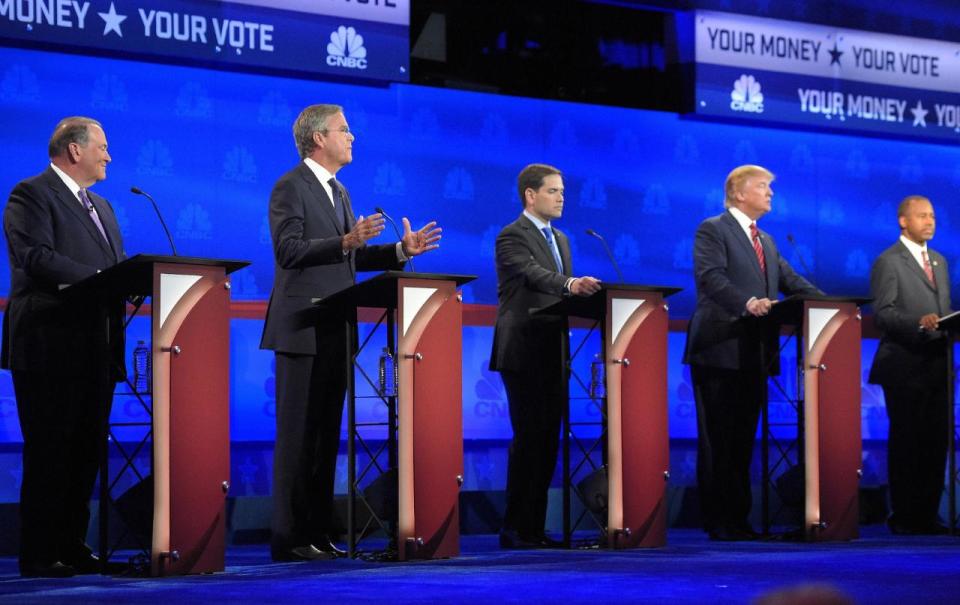Republicans suspend partnership with NBC News following debate
The Republican National Committee (RNC) announced Friday that it is suspending its relationship with NBC News following the third GOP presidential primary debate this week.
RNC Chairman Reince Priebus wrote a letter to NBC News Chairman Andrew Lack saying that the organization’s sole role in the primary debate process is to ensure that its candidates are given a full and fair opportunity to outline their vision for the future of the United States.
This was not the case, Priebus said, for the conservative politicians onstage at the University of Colorado’s Coors Events Center in Boulder on Wednesday evening.
“The CNBC network is one of your media properties, and its handling of the debate was conducted in bad faith,” the letter reads. “We understand that NBC does not exercise full editorial control over CNBC’s journalistic approach. However, the network is an arm of your organization, and we need to ensure there is not a repeat performance.”
According to Priebus, the business news channel did not deliver on several promises: (1) The debate did not focus on key issues that matter to voters, such as job growth, taxes, technology, retirement and the national economy; (2) candidates did not receive opening questions on the economy or finance; and (3) speaking time was not monitored carefully to ensure fairness.
The conservative leader characterized the questions as “inaccurate or downright offensive.” He cited the first question directed to party frontrunner Donald Trump as to whether he was running a “comic-book version of a presidential campaign” as an example.

Jeb Bush, gesturing, is flanked by, left to right, Mike Huckabee, Marco Rubio, Donald Trump and Ben Carson during the CNBC Republican presidential debate at the University of Colorado in Boulder on Oct. 28. (Photo: Mark J. Terrill/AP)
“While debates are meant to include tough questions and contrast candidates’ visions and policies for the future of America, CNBC’s moderators engaged in a series of ‘gotcha’ questions, petty and mean-spirited in tone, and designed to embarrass our candidates,” the letter continues. “What took place Wednesday night was not an attempt to give the American people a greater understanding of our candidates’ policies and ideas.”
Priebus said he respects the First Amendment and freedom of the press but also expects the media to host a “substantive debate on consequential issues” — something he said CNBC failed to do.
The next Republican presidential debate scheduled to air on an NBC network was slated for Feb. 26, 2016. Its sponsors were NBC/Telemundo and the conservative magazine National Review.
“While we are suspending our partnership with NBC News and its properties, we still fully intend to have a debate on that day and will ensure that National Review remains part of it,” he said.
Priebus said he will discuss the best ways to move forward with the Republican Party’s presidential candidates.
In response, NBC News released this statement:
“This is a disappointing development. However, along with our debate broadcast partners at Telemundo, we will work in good faith to resolve this matter with the Republican Party.”
The mounting tension was evident during the debate as the candidates and the moderators shared several heated moments.
At one point, for instance, Texas Sen. Ted Cruz lambasted the moderators for the tone of their questions.
“This is not a cage match,” Cruz said, when asked about the national debt. “Look at the questions: ‘Donald Trump, are you a comic-book villain?’ ‘Ben Carson, can you do math?’ ‘John Kasich, will you insult two people over here?’ ‘Marco Rubio, why don’t you resign?’ ‘Jeb Bush, why have your numbers fallen?’ How about talking about the substantive issues people care about?”
Several times the moderators’ questions elicited boos from the audience, including when Carl Quintanilla asked retired neurosurgeon Ben Carson about his ties to medical supplement company Mannatech, noting that Carson’s picture appeared on the company’s website.
When Carson said that he didn’t give Mannatech permission to use his image, Quintanilla asked, “Does that not speak to your vetting process or judgment in any way?”
The audience booed loudly as Carson replied, “No, it speaks to the fact that I don’t know what was going on.”
The crowd also booed moderator John Harwood when he asked Huckabee if he thought Trump had the “the moral authority to unite the country.”
“I love Donald Trump. He is a good man. I’m wearing a Trump tie tonight,” Huckabee replied.
“Such a nasty — such a nasty question,” Trump said, “but thank you, Governor.”
The next day, there was bipartisan backlash against the moderators in the media.
National Review columnist John Fund said that he has watched many debates in which liberal media bias was evident but has never seen it unite Republican presidential candidates before.
“They rose up in revolt and called out the moderators for it — led by Ted Cruz and followed effectively by Rubio, Christie and Trump,” Fund wrote. “It was an epic moment, and I think it rattled the cages of mainstream media types everywhere.”
New York Times television writer James Poniewozik similarly said that the debate quickly devolved into a match between the candidates and CNBC and that the network “lost in a rout.” He said moderators came across as both aggressive and underprepared, which proved a “fatal combination.”
“There are plenty of reasons CNBC fell short. That it angered Mr. Priebus is not among them. A debate team’s job is not to keep the talent happy as if they were actors whose contract riders need to be fulfilled but to challenge the candidates — firmly but fairly,” he wrote.
“That is the general principle, but CNBC did not make itself easy to defend with its execution. It could have used its stature as a specialized business network to dig down into economic issues. Instead it got derailed with trivia, needless fighting and good-in-theory questions with botched execution.”


